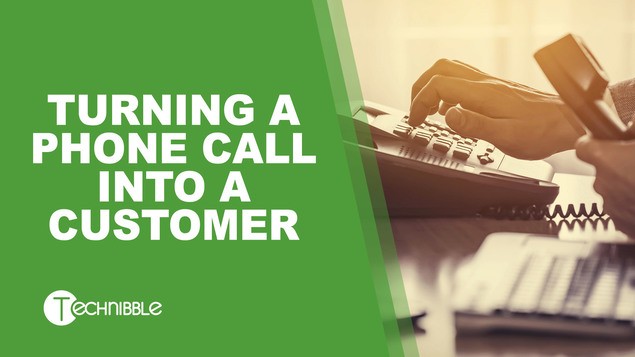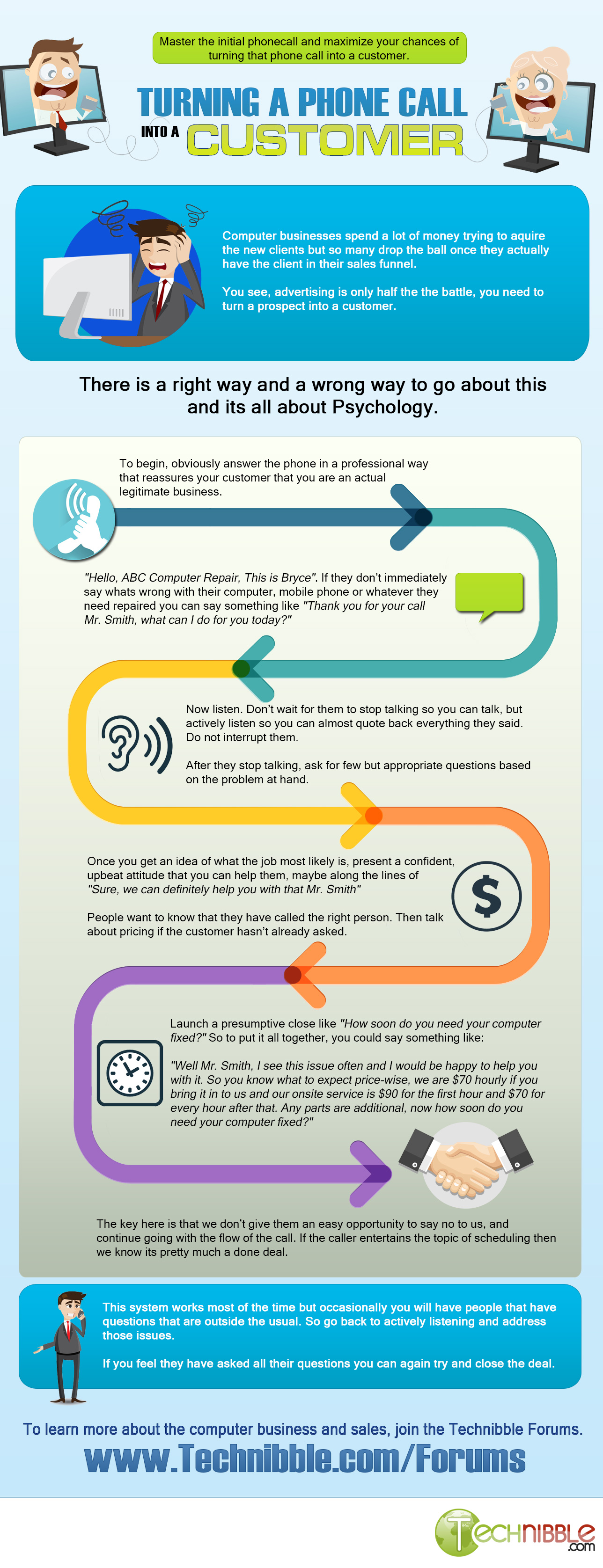Almost there! Please complete this form and click the button below to gain instant access.
Turning A Phone Call Into A Customer
We hate SPAM and promise to keep your email address safe.

In this episode of the Technibble Computer Business Podcast (with transcript below), I am going to tell you some methods on how to master initial phone-call’s and maximize your chances of turning that phone call into a customer.
Podcast: Play in new window | Download (Duration: 4:26 — 4.3MB)
Subscribe: Apple Podcasts | Spotify | RSS
00:25 – Most businesses are too focused on getting clients
00:52 – Right and wrong way on converting phone calls.
01:16 – Really listen to the caller.
02:00 – People want to know they will hire the right person.
02:37 – The opportunity for them to say “No”
03:09 – People with extra questions
03:27 – Tracking your advertising.
To learn more about the computer business and sales, join the Technibble Forums. If you have anything to add to the discussion, please drop us a comment below.
Download PDF Article“The best way to answer phone calls from potential clients.” [Click To Tweet]
“Maximize your chances of converting a phone call into a client” [Click To Tweet]
“How to close the sale when a client calls you” [Click To Tweet]

Most business owners focus heavily on getting NEW clients. “How can I get more clients? what forms of advertising should I use? What works best?” and so on. Computer businesses spend a lot of money trying to acquire the new clients but so many drop the ball once they actually have the client in their sales funnel.
You see, advertising is only half the the battle, you need to turn a prospect into a customer.
There is a right way and a wrong way to go about this and its all about psychology. To begin, obviously answer the phone in a professional way that reassures your customer that you are an actual legitimate business.
“Hello, ABC Computer Repair, This is Bryce”. If they don’t immediately say whats wrong with their computer, mobile phone or whatever they need repaired you can say something like “Thank you for your call Mr Smith, what can I do for you today?”
Now listen, and I mean really listen. Not waiting for them to stop talking so you can talk, but actively listen so you can almost quote back everything they said if you had to. Do not interrupt them at this stage or try to steer them as you can break their flow. Its up to you to pick out the key points to get an idea of what the job might involve . After they stop talking, ask the appropriate followup questions based on the problem at hand, but not too many questions. Just enough so you have a good idea on what kind of job you are getting into.
Once you get an idea of what the job most likely is, present a confident, upbeat attitude that you can help them, maybe along the lines of “Sure, we can definitely help you with that Mr Smith” or “Sure, we can take a look at it and see what the problem is”. People want to know that they have called the right person.
Straight after that, talk about pricing if the customer hasn’t already asked, you generally want to say this in the same breath as the previous reply.
Again, in the same breath, launch a presumptive close like “How soon do you need your computer fixed?”
So to put it all together, you could say something like “Well Mr Smith, I see this issue often and I would be happy to help you with it. So you know what to expect price-wise, we are seventy dollars hourly if you bring it in to us and our onsite service is $90 for the first hour and seventy dollars for every hour after that. Any parts are additional, now how soon do you need your computer fixed?”
The key here is that we don’t give them an easy opportunity to say no to us, the easier option for them is to continue going with the flow.
We don’t ask if the price is “OK” with them because this generates an opportunity for them to say no. If they dont say anything we can assume that it is OK with them. We don’t ask them to think about it nor ask “how does that sound to you?, or anything else that may result in a negative response. We ask “how soon do you need… whatever”. If the caller entertains the topic of scheduling then we know its pretty much a done deal.
This system works most of the time but occasionally you will have people that have questions that are outside the usual. So go back to actively listening and address those issues, again in a positive and affirmative manner. if you feel they have asked all their questions you can again try and close the deal. “Sure, we can definitely help you with that. How soon do you need it fixed?”
Now, I want you to put this into action the very next call you get. I have provided a template script below that you can print off and put by the phone.
If you find that there are certain questions that your customers always ask, add it to your script to prevent the NEED for clients to ask that in the future.
Session expired
Please log in again. The login page will open in a new tab. After logging in you can close it and return to this page.
Another great article and podcast. Keep up the good work and thank you
What do you answer if a customer ask “How I know how much time you spent on fixing my computer if I send over. You might spent 4 hours and charging me 6”?
Thank you Bryce
I know that can be very annoying and somewhat hurtful to the point where you want to flip out but remember to always be professional. To avoid that I charge a flat rate for the service when I bring the machine in-house. When I do visits I charge hourly.
Awesome Podcast! I needed to hear this. Thanks